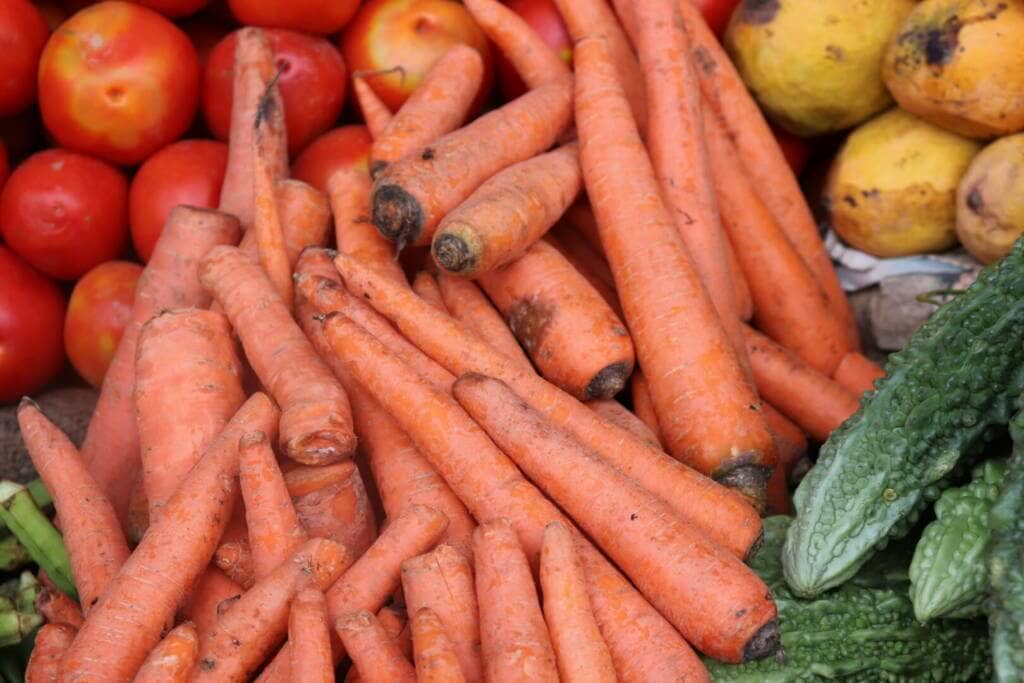Highlights
Researchers from the University of Southern Denmark analyzed data from a large cohort study in Danish men and women to evaluate the association between carrot intake and risk of colorectal cancer. The study found that a very high intake of raw, uncooked carrots may benefit in reducing colorectal cancer risk, however, consuming cooked carrots may not be helpful.
When we read blogs which highlight the potential benefits of a commonly consumed vegetable, which we most likely already consume on a daily basis, it may seem like that’s perfect as one doesn’t have to change anything in the diet. However, when it comes to foods like carrots, health differences can only be seen if over a certain amount is eaten each week. Carrots, a tasty and crunchy vegetable that dare I say pairs perfectly with some Ranch dressing, has more benefits than just potentially helping improve your eyesight. In fact, in terms of the ability of raw fruit or vegetable supplementation to aid in prevention of specific cancers, carrots can also have a positive impact.

Carrots Intake and Colorectal Cancer Risk
Colorectal cancer is a relatively common cancer that affects a person’s rectum and colon. While treatable if detected early, once this cancer metastasizes through the body, which in many cases happens, it becomes more difficult to treat. Carrots have proved to have anti-cancer properties in several meta-analysis studies, but not in a large cohort study.
In 2020, researchers from the University of Southern Denmark carried out a large cohort study to evaluate the effect that carrot intake may have on colorectal cancer risk. A total of 57,053 Danish people participated in the researchers’ Diet, Cancer, and Health Study and self-reported a range of statistics including their BMI, alcohol intake, age group, gender, and of course, their carrot intake. After analyzing the data, the researchers found “that a high carrot intake corresponding to >32 g raw carrot per day was associated with a 17% decreased risk of colorectal cancer, whereas an insignificant difference in risk of colorectal cancer was observed for those eating less than 32 g raw carrot per day, compared to those eating no raw carrot” (Deding U et al, Nutrients., 2020).
It is important to also note that there was no significant difference in colorectal cancer risks for people who cooked their carrots and ate them. In other words, people who generally showed a decreased risk of colorectal cancer ate more than 32 grams of raw (not cooked) carrots a day. This is most likely because cooking the carrots may remove key active compounds of carrots which have nutritional and anti-cancer properties.
Foods to Eat After Cancer Diagnosis!
No two cancers are the same. Go beyond the common nutrition guidelines for everyone and make personalized decisions about food and supplements with confidence.
What do Carrots contain?
Carrots are rich in antioxidants such as carotenoids which are provitamin A that are converted to retinol by the human body during digestion and have previously shown to reduce the risk of cancers such as skin cancer. In addition to this, carrots are the main source of the bio-active compounds falcarinol (FaOH) and falcarindiol (FaDOH) which are integral due to their anti-inflammation and anti-cytotoxic properties. However, this doesn’t indicate that taking very high amounts of carotenoids in the form of supplements is beneficial, especially when one is undergoing treatment for cancers such as breast cancer. A study has previously indicated that use of antioxidant supplements such as carotenoids before and during breast cancer treatment may be associated with an increased hazard of cancer recurrence. (Ambrosone CB et al, J Clin Oncol., 2019)
Conclusion
Apart from general benefits of carrots like supporting eye health and reducing cholesterol levels, it can also have impact in reducing the risk of specific cancer types.
Today, when the world is fighting the deadly COVID-19 attack and our health is of utmost priority, substituting our next bag of chips or junk food for a bag of carrot may be healthy, however, taking random dietary supplements by a cancer patient may not be always safe and benefit us.
What food you eat and which supplements you take is a decision you make. Your decision should include consideration of the cancer gene mutations, which cancer, ongoing treatments and supplements, any allergies, lifestyle information, weight, height and habits.
The nutrition planning for cancer from addon is not based on internet searches. It automates the decision making for you based on molecular science implemented by our scientists and software engineers. Irrespective of whether you care to understand the underlying biochemical molecular pathways or not - for nutrition planning for cancer that understanding is needed.
Get started NOW with your nutrition planning by answering questions on the name of cancer, genetic mutations, ongoing treatments and supplements, any allergies, habits, lifestyle, age group and gender.

Personalized Nutrition for Cancer!
Cancer changes with time. Customize and modify your nutrition based on cancer indication, treatments, lifestyle, food preferences, allergies and other factors.
Cancer patients often have to deal with different chemotherapy side effects which affect their quality of life and look out for alternative therapies for cancer. Taking the right nutrition and supplements based on scientific considerations (avoiding guesswork and random selection) is the best natural remedy for cancer and treatment related side-effects.
